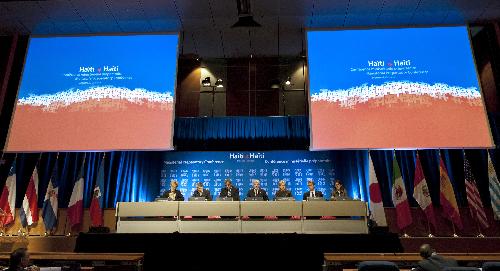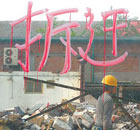Top News
Montreal conference endorses roadmap for Haiti recovery
(Xinhua)
Updated: 2010-01-26 14:35
 |
Large Medium Small |
MONTREAL/UNITED NATIONS: Recognizing the huge challenges in rebuilding the quake-ravaged Haiti, the international community on Monday endorsed a roadmap to gradually restore order in the Caribbean nation.
Major donors and regional and multilateral partners agreed to restore the operational capacity of the government of Haiti and urgently conduct post-disaster and reconstruction-focused needs assessments.
Recognizing the continued leadership and sovereignty of the government of Haiti, the participants held that an initial 10-year commitment was essential in concerted efforts to rebuild Haiti's capacity.
"Sustainable development, including environmental sustainability, climate resilience, disaster risk reduction and emergency preparedness, will be a cornerstone of our joint approach," they said in a statement.
Haiti's Prime Minister Jean-Max Bellerive appealed for "more and more" aid and support for his people after the 7.3-magnitude quake on Jan. 12 that killed up to 200,000 and left hundreds of thousands more people injured and homeless.
"What we're looking for is a long-term commitment ... At least five to 10 years," he said.
Despite all of the world's enthusiasm and generosity in helping Haiti out of its dire situation, UN officials warned that relief efforts would not be easy for the country.
Recovery for Haiti could be "one of the most complex operations" considering its battered infrastructure, said the UN World Food Program (WFP) chief.
"It will take some time for the food infrastructure to come on line," WFP Executive Director Josette Sheeran said at a press conference at the UN Headquarters in New York.
Sheeran said one of the main priorities had been the creation of "orderly, secure distribution" sites for food, addressing such issues as adequate food escorts to ensure delivery.
Noting that there have been some episodes of food riots, Sheeran said that "we are concerned that the most vulnerable -- children and women can easily get overrun."
Currently WFP has two daily flights that carry relief supplies into Haiti, in addition to warehouses that are set up in the Dominican Republic where trucks are stationed to bring supplies into Haiti.
Haitian authorities last week launched a huge operation to relocate the quake-displaced people in Port-au-Prince to temporary villages in neighboring suburb areas.
Some 100,000 survivors will be arranged to live in tent villages of 10,000 people each at Croix Des Bouquets, northeast of Port-au-Prince, at the initial stage of the operation, they said. The program will relocate at least 400,000 survivors.














